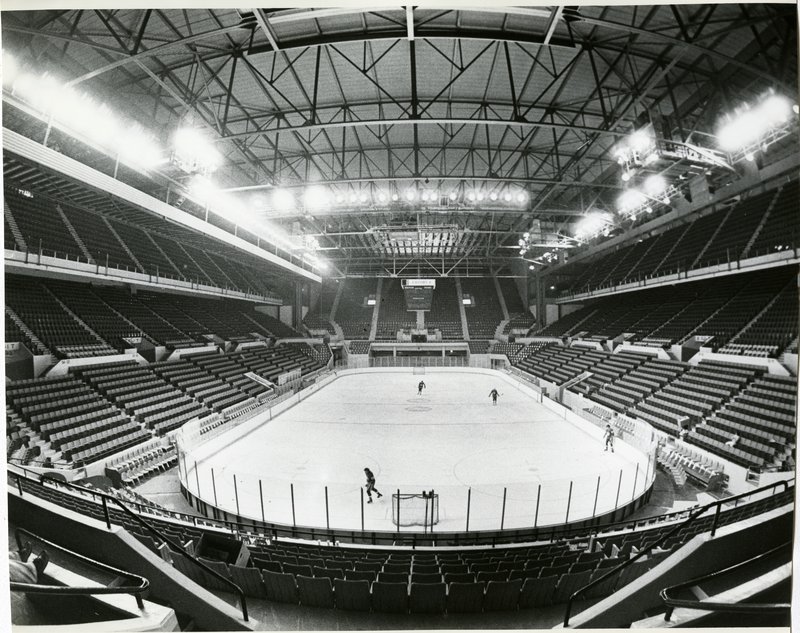
Winnipeg Arena // Photo: U of M Archives and Special Collections
Revisiting a study on who’s to blame for aggression in hockey
Winnipeg police are investigating an incident that occurred on Feb. 16 at a Winnipeg hockey tournament for 12-year-olds. A video of the event is posted on YouTube. It has gotten many people talking about violence in hockey.
In 2011 we reported on a novel study by a team of Canadian researchers, and it seems a good time to revisit it. The study found that coaches are the biggest factor in determining the levels of an adolescent’s on-ice aggression, as measured in penalty minutes.
What’s more, the study also found that the more coaches and parents endorsed aggression, the less likely players were to view them as leaders worthy of following. The study’s data also revealed that teams with high rates of aggression won fewer games.
Nick Turner explains his findings
The study, published in the journal Leadership Quarterly, looked at 183 players (average age 13) on 16 recreational hockey teams in Ontario. The researchers, from the University of Manitoba, the University of Regina and Queen’s University, measured teenagers’ perceptions of their coaches’ leadership and their own parents’ leadership. They measured players’ penalty minutes throughout the season while measuring player performance (goals and assists) and team performance (percentage of games won).
“Although parents are not particularly influential I do not think their behaviour, like banging on the glass, is vindicated,” says Nick Turner, one of the study’s authors and the Associate Dean of the U of M’s Asper School of Business.
“What should really be taken away from this study is that we should really think carefully about the selection of team coaches and the messages that they send their teams.”
At the core of it, the study wanted to find out what motivates people to “do good” or “play well”. A coach’s attitudes towards aggression, the study found, impacts the overall team-level aggression. Players then take their cue of what is expected of them from this dynamic; adhering to the personality of the team, if you will.
Research at the University of Manitoba is partially supported by funding from the Government of Canada Research Support Fund.







It’s so shameful what has happened to the great game of hockey. It seems like some parents are ruining it for everyone. Always thinking their kid has been wronged by the ref for some reason. The recent incident at Southdale Arena doesn’t surprise me one bit. I have taken my kids there multiple times to watch games. And in most causes left due to obnoxious parents and their foul language. Also the rules that are suppose to be in effect never are. The management running it really need to get control of the place. It’s so sad that stuff like this is becoming a regular occurrence. I think a lifetime ban of some parents are in need.
I’ve enjoyed many games, where encouraging and cheering parents and coaches make it a positive experience for the players. On the flip side, I’ve also seen games where the officials let overly-aggressive players continue their actions until tempers flare or someone is injured. How are children supposed to differentiate between the NHL, and minor hockey games. I believe, eventually, that ALL excessive fighting will stop, but I’m afraid that it will take something worse than a Sidney Crosby incident to do it. Of course, attitudes of the parents are passed on to their children, and that’s where the change must start. Realistically, hockey is a physical game, but there’s no reason it has to be violent. That’s the lesson that needs to be taught – to players, parents and coaches.
The final results from this year’s Sochi Olympics support some of the findings of these researchers. The Canadian team played amazing, clean, great hockey and won their back to back to back to back fourth Gold Medal in men’s hockey. It was fun and exciting to watch, unlike most NHL hockey which, although they seem to have somewhat cleaned up their act, still has too many goons, cheap shot artists and thugs going out to do damage to the star players in order to justify their spot on their teams. You could probably count the number of penalties the Canadians incurred throughout the entire Olympics on one hand. And they won the Gold Medal. And it was great to watch. As the research indicates, the teams with more penalties do not do as well in the standings as other teams. These Olympic results verify that.